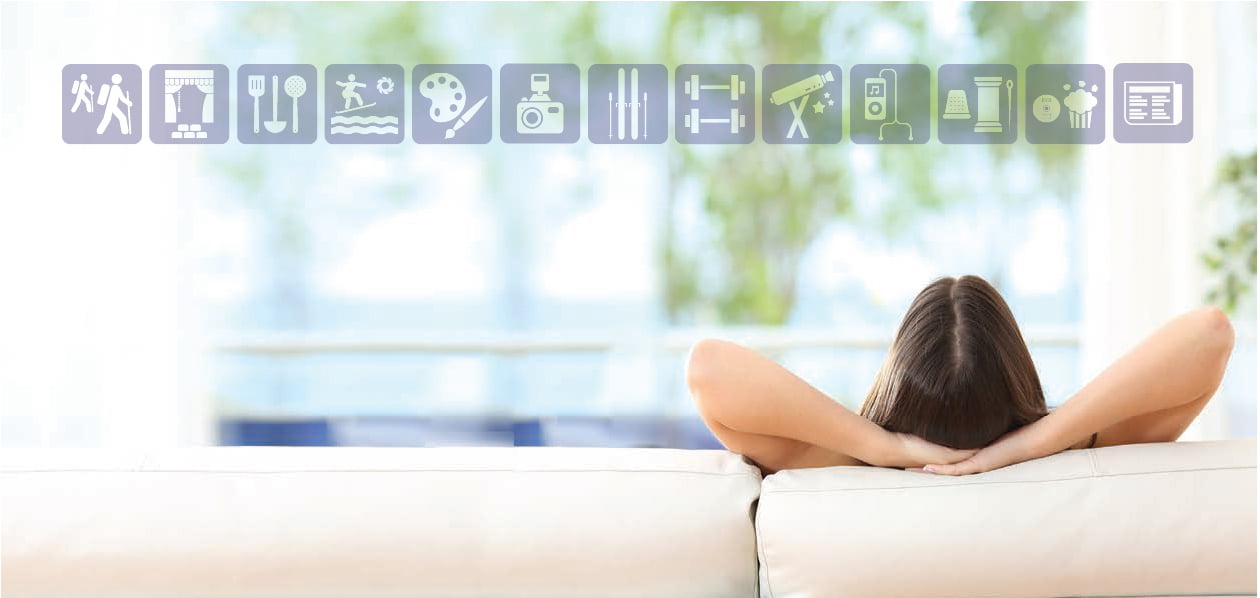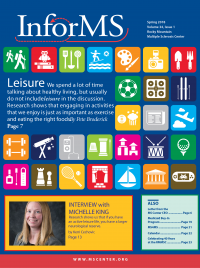
Wellness is the key to healthy living, and it’s critical to those with chronic diseases like multiple sclerosis. It’s accepted by most that things like eating well, regular exercise and maintaining a generally healthy lifestyle are important factors in wellness. For those living with MS, healthy living has many added benefits: Keeping your body healthy can help your immune system better fight MS and its various symptoms, and can also lower the risk posed by complications that can come from other problems, like diabetes and heart disease.
We spend a lot of time talking about healthy living, but a major component often left out of these discussions is leisure – the time we spend doing activities that are purely for our own enjoyment. Dedicating time for things you like to do can have profound effects on emotional wellbeing, enhancing social connections and helping stave off isolation and depression. Many hobbies can keep your brain active a sharp, which is a key component in promoting lifelong brain health that can help slow MS progression. Recreational activities often have a physical component, getting your body moving in ways that may be more enjoyable than your daily exercise routine.
In this issue, we’re taking a look at leisure – what it is, why it hasn’t always been a part of what we consider wellbeing, and why that’s changing.
Leisure: What it is, Why it’s Important, and How to Make it Part of Your Life
It’s hard to define exactly what “leisure” means because it’s different for every person. There’s no master list of what activities qualify as leisure, and similarly there’s no list of what doesn’t. We have to rely on each individual to decide what leisure means to them, though we can give you some guidelines.
Generally speaking, we can identify a leisure activity by three main components.
First, it’s something that happens during free time – not during work, or when you’re taking care of routine household tasks or other obligations. For example, no matter how much you enjoy cooking, making the kids’ lunches before school probably doesn’t qualify as leisure.
Second, it’s usually made up of certain kinds of activities – playing games or sports, reading a book, outdoor activities, crafting, even watching a movie. Back to the cooking example, if it’s truly something you enjoy, then absolutely cooking can be a leisure activity.
Lastly, it’s something that you know is leisure – when you’re conscious that you’re involved in an activity that’s got nothing to do with getting a task done, or someone’s counting on you to do, then you’re likely involved in leisure. To the kitchen once more: Consider the difference between cooking for the fun of it, and cooking because there’s a family counting on you for dinner. Sure, there’s a meal after both, but one’s purely for your enjoyment, while the other’s clearly an item from the to-do list.
None of this is to say that you can’t – or shouldn’t – get some enjoyment out of your daily tasks, your work, or chores. If you can make folding the laundry enjoyable, by all means, you should. But when we talk about leisure, we mean both the time and the activities that are set apart from things that “have” to be done.
Leisure’s Bad Rap
Leisure is often viewed as something extra. Rather than a necessary part of our lives, it’s more a reward for completing the things we “have” to do.
Let’s face it, we live in a society that puts a high value on productivity. For a lot of us, our work defines us in many ways. “What do you do for a living?” is typically one of the first questions we’re asked when we meet someone.
Those of us that don’t work, either by choice or by necessity, can find ourselves in an odd place when it comes to something like leisure time. If you’ve “put in your hours,” you certainly deserve some time to yourself – but what if you haven’t?
Regardless of your situation, most of us also pack so much activity into our lives that there’s little room for things we view as less important than our tasks. The laundry won’t fold itself, the house could always use some more dusting… and all that cooking from the examples above? After enjoying your meal, you’ve got a sink full of dishes to deal with.
Our crunch for time and our drive to get things done turns much more complicated when living with a chronic disease like MS — so many routine symptoms affect what we’re able to do, and when symptoms go beyond routine, finishing that task list can become nearly impossible.
When you’ve got a full plate, and on top of it you’re dealing with fatigue, double-vision, spasticity or pain — who’s got time or energy for hobbies, relaxing, or purely recreational activities?
Go to work. Take care of your home. Get through that to-do list. And do it all while managing your life with MS. Then, maybe there will be some time for something you really enjoy, but only if you’re not exhausted.
This way of thinking often makes leisure an afterthought for us. It’s not always viewed as a necessary component of a balanced life – instead, leisure and recreation are reserved for only after our work is done, and even then, only if there’s time. Our daily routines, our household chores, that long list of to-dos – they all come before we make time for ourselves.
That thinking is all too common among medical professionals, as well. In the context of a medical treatment plan, leisure is something many doctors don’t specifically advise a patient to pursue.
We’ve made a lot of progress over the years adding many different disciplines to the standard of what we call “comprehensive care.” We now know how important nutrition is to our wellbeing, and what effects mental and emotional health can have on us physically. It’s a generally accepted fact that exercise is a necessary part of a healthy life, and even the age-old advice of “getting a good night’s sleep” has been exhaustively researched and deemed to be true.
Health care in general has turned toward models of overall wellness and healthy living, with a heightened focus on preventative care. We know that even those living with a chronic illness like MS can greatly benefit from general wellness, many components of which have been shown to reduce symptoms, lessen the severity of exacerbations, and even slow disease progression.
But despite advancements in understanding about the many things that make up a healthy lifestyle and contribute to general wellness, a patient’s recreational activities aren’t always at the top of their doctor’s priority list.
Fortunately, that’s beginning to change.
Recognizing the Importance of Leisure for our Brains and Overall Wellbeing
A steadily evolving body of research shows exactly how important leisure and recreation are to overall health. As healthcare providers see these benefits more and more, they’re turning to the growing field of Therapeutic Recreation for the expertise and experience in treating patients through recreation and leisure activities.
 According to the American Therapeutic Recreation Association (ATRA), recreation therapists “embrace a definition of ‘health’ which includes not only the absence of ‘illness,’ but extends to enhancement of physical, cognitive, emotional, social and leisure development so individuals may participate fully and independently in chosen life pursuits.” ATRA sums up their field’s philosophy plainly and simply: “People with active, satisfying lifestyles will be happier and healthier.”
According to the American Therapeutic Recreation Association (ATRA), recreation therapists “embrace a definition of ‘health’ which includes not only the absence of ‘illness,’ but extends to enhancement of physical, cognitive, emotional, social and leisure development so individuals may participate fully and independently in chosen life pursuits.” ATRA sums up their field’s philosophy plainly and simply: “People with active, satisfying lifestyles will be happier and healthier.”
Recognizing how important leisure is to general health, therapeutic recreation is concerned with making sure leisure and recreation is accessible to everyone, regardless of their ability. This is particularly important for those living with MS, when anything from routine symptoms to advanced effects of the disease can make even the idea of recreation a seemingly daunting proposition.
According to ATRA, research into therapeutic recreation programs has significant positive impacts on a number of health outcomes:
Physical health: Since many recreation activities are physical in nature, there’s a component of exercise built in. Exercise and physical activity is a well-known component of a healthy lifestyle, and therapeutic recreation can help tailor physical activities that not only suit a person’s abilities, but also their interests.
Psychosocial health: Defined as mental, emotional, social and spiritual wellbeing, a boost in psychosocial status can result from leisure and recreation’s tendency to relieve tension and stress. Making time for an activity you enjoy is not only a break from work and other responsibilities, but also a break from thinking or worrying about them.
Cognitive health: Active brains are healthy brains, and keeping your mind active is a key part of maximizing lifelong brain health – the cornerstone of the Rocky Mountain MS Center’s treatment philosophy. Engaging in activities you enjoy can boost emotional and cognitive health by keeping the brain sharp, beyond the daily routine of work, your task list and chores.
Research led by the University of North Carolina’s Barbara Fredrickson demonstrated that positive emotions can help manage and even reverse the negative impacts that stress can have on our health. By incorporating engaged leisure activities into our lives, our brains can focus on challenges, learning and fun instead of ruminating on worries. It gives our brains a chance to reset and rest.
For more information on the benefits of leisure and therapeutic recreation for health and wellness, and how the concepts of the field are put to use every day at the Rocky Mountain MS Center’s King Adult Day Enrichment Program (KADEP), see our interview with KADEP Director Michelle King.
Making Leisure and Recreation Part of Your Routine
The ATRA says recreation therapists have been around for a long time in places like health care agencies, inpatient hospitals and residential health facilities. But with this growing understanding that leisure is an important aspect of overall health, the field is expanding far beyond its traditional roles.
Recreation specialists can now be found in mental health centers, adult day programs, community centers and school systems. There’s even a growing number of TRs working in private practice providing services directly to individual clients.
Leisure and recreation is becoming so accepted as a part of wellness that many insurance providers now consider therapeutic recreation as a reimbursable expense. That’s not to say they’ll fund all your hobbies, but they may cover things like consultation with a Recreation Therapist, or therapy sessions that have been recommended by a physician.
Either way, it’s worth doing your own research – see what opportunities are available through health centers, gyms or organizations near you, then ask what might be covered. See if they accept insurance, and if they do, check with your provider to see what services might be covered.
If a formal recreation therapy experience isn’t in the cards for you, you can still make sure leisure and recreation are a part of your life.
Find something you enjoy doing. Maybe it’s a hobby you’ve given up, maybe a sport you didn’t think you could play anymore. If necessary, find a way to adapt it to your life and make it possible.
Make time for it. Set aside some time, and keep your appointment. Protect your time from work, chores, or anything else that might disrupt it. Whether you use your Outlook calendar on your phone or a paper day-planner, schedule in time, even if it’s just 15 minutes per day, and treat it like every other calendar item on your agenda.
Understand you need it. Leisure isn’t just for those working long hours in demanding jobs – we all need regular, healthy breaks from our day to day responsibilities.
Take it seriously. We’ve established that your leisure time is an important component of wellness – now don’t forget to treat it that way. Avoid falling back into the thought process that sees leisure as “extra” or “bonus.” It’s not an add-on, it’s an important, enriching, and healthy part of life.
Leisure is, at its most basic level, doing something you enjoy doing, with no particular responsibility or need to get things done. Especially in a group setting, recreational activities can connect you with your community, get you out and socializing with friends and peers, or help you build or maintain a social network.

